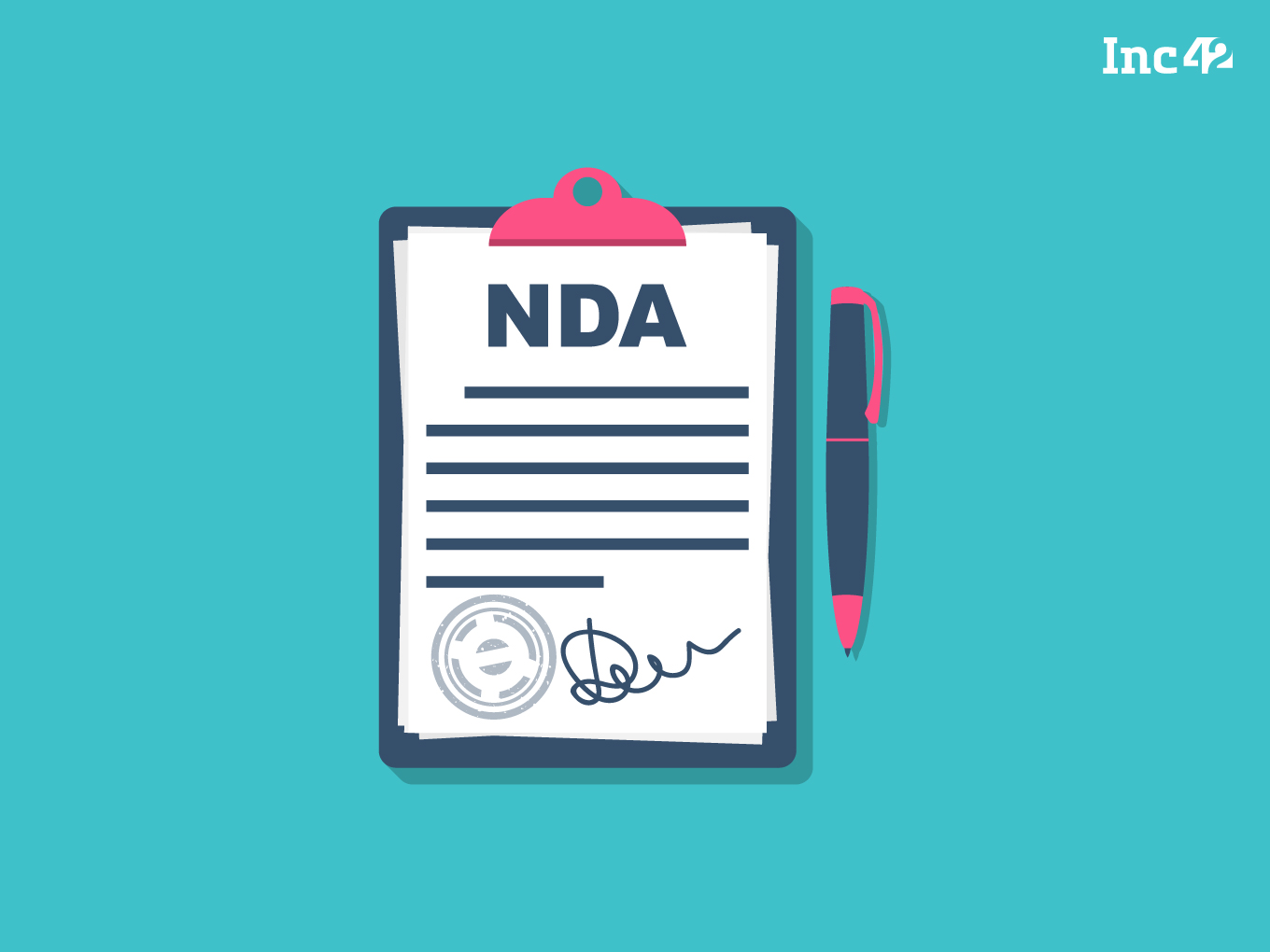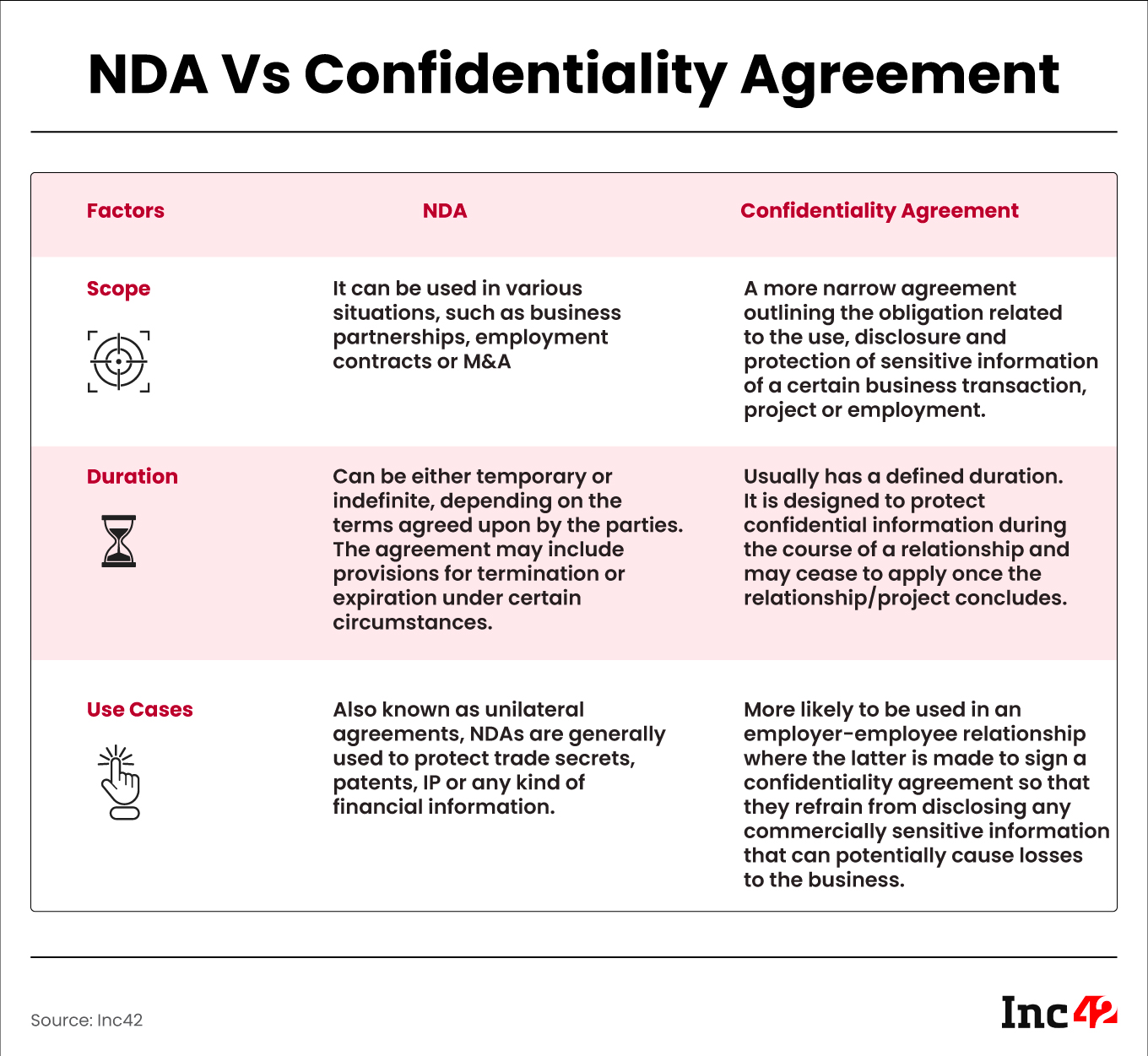Here’s Everything You Need To Know About A Non-Disclosure Agreement (NDA)

What Is A Non-Disclosure Agreement (NDA) & Why Is It Important?
A Non-Disclosure Agreement (NDA) is a legally enforceable agreement designed to maintain the confidentiality of specific information shared between parties.
There are essentially two types of NDAs:
Mutual NDA: This kind of NDA is commonly used when two businesses are exploring a potential partnership or collaboration. During strategic discussions, both parties may need to share confidential information for making informed decisions.
Non-Mutual NDA: If a new employee gains access to sensitive information within a company, they are made to sign a non-mutual or unilateral NDA. This agreement is signed solely by the employee who is bound to maintain confidentiality.
Having an NDA is very crucial for startups as it not only protects their intellectual property rights but also ensures the security of internal business models and processes.
An NDA establishes a legal framework that safeguards a startup’s ideas and information and prevents theft or unauthorised sharing with its competitors or third parties. An NDA protects valuable information such as trade secrets, proprietary technology, client data, in-house research, and marketing strategies, among others.
Breaching an NDA can lead to significant financial penalties and court-ordered prohibitions.
Who Typically Signs It & In What Situations?
Businesses can employ NDAs for a number of reasons and with multiple parties, including:
- Employees: Employees are often made to sign NDAs to safeguard proprietary information, trade secrets, client lists, marketing strategies or any other confidential information related to businesses.
- Parties Involved In Mergers & Acquisitions: In case of an acquisition deal, a startup may ask its prospective buyer to sign an NDA to protect crucial information, such as financials, customer data and other sensitive data, from being compromised or leaked.
- Contractors, Vendors & Freelancers: Regular business partners and contractual hires may be asked to sign NDAs to protect confidential information.
- C-Suite Executives: NDAs play a crucial role at the time of hiring top executives like CFOs, COOs, or CTOs. This is because companies often onboard many such executives from rival companies.
- Cofounders: While cofounders often begin with a strong bond of trust, circumstances can change over time, impacting relationships. To protect the company’s confidential information, it is advisable for cofounders to sign an NDA.
When Can Startups Exclude NDAs From The Equation?
Asking a potential investor such as an angel investor or a VC to sign an NDA can be taken negatively. This is because institutional investors meet an overwhelming number of companies seeking funding. This makes it impractical for investors to review and comply with NDAs from every company.
However, even without NDAs, it is not in the investor’s best interest to disclose his company’s ideas. They understand the importance of maintaining their reputation and credibility to continue receiving investment opportunities. Nevertheless, startups need to conduct their due diligence on potential investors.
What Are The Key Components Of An NDA?
- Parties involved
- A concise definition of what is deemed to be confidential
- The scope of the confidentiality obligation
- The exclusions from confidential treatment
- The terms of the agreement
Can It Be Used In International Business Transactions?
Yes, NDAs can be used in international business transactions. However, it is common for international parties to have their own regulations and legal framework governing the enforcement of NDAs.
What Are The Key Differences Between An NDA And A Confidentiality Agreement?
Although both agreements are used to protect crucial information and can be used interchangeably, they can differ in some key areas, including:

Is It Necessary To Involve A Lawyer While Drafting An NDA?
While it is not always necessary to have a lawyer draft an NDA, seeking legal guidance is advisable due to the complex legal concepts involved and the need to ensure enforceability.
What Are The Potential Risks Of Signing An NDA?
One of the main drawbacks of an NDA is that it initiates a relationship with a sense of mistrust. This initial atmosphere can significantly impact the overall dynamics and might not always lead to a positive outcome. For instance, requiring employees to sign NDAs can deter highly skilled individuals from joining the company, as they would be restricted from discussing their work in the future.
Likewise, asking current employees to sign NDAs for special projects can negatively affect their experience and make them feel less trusted within the organisation. Additionally, if an NDA is violated, it can potentially result in legal disputes, causing an issue for all parties involved.
How Does It Differ From A Non-Compete Agreement?
Confidentiality/non-disclosure agreements refer to contractual arrangements where employees pledge to refrain from disclosing specific proprietary information, including trade secrets. On the other hand, non-compete agreements involve contracts in which employees commit to refrain from engaging in unfair competition with their employers.
Can An NDA Be Waived Or Released, If So, How Does This Affect The Protected Information?
It can be waived or released by mutual agreement of the parties involved, and the impact on the protected information depends on the specific terms of the waiver or release, such as whether it is a complete or a partial waiver, time-limited or subject to other conditions.
The post Here’s Everything You Need To Know About A Non-Disclosure Agreement (NDA) appeared first on Inc42 Media.
No comments